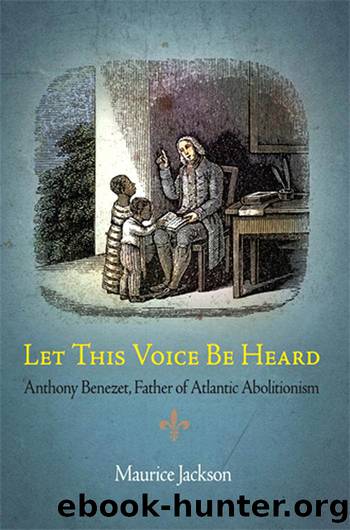Let This Voice Be Heard by Jackson Maurice;

Author:Jackson, Maurice;
Language: eng
Format: epub
Publisher: University of Pennsylvania Press
Charles Ignatius Sancho
Charles Ignatius Sancho was born aboard a slave ship during the middle passage âa few days after it quitted the coast of Guinea for the Spanish West Indies.â79 Consequently, he had no immediate memories of Africa, even though he was born to an African mother and father.80 His father committed suicide rather than live the life of a slave; his mother died when he was two. Baptized by a Catholic bishop as Ignatius, he was given to three maiden sisters in Greenwich, England, who then gave him the surname Sancho purportedly because he resembled the antihero squire in Cervantesâs Don Quixote. Unlike the Guerin sisters, who helped educate Equiano, they denied Sancho education, thinking it would make him indolent. Sanchoâs earliest biographer, Joseph Jekyll, wrote that the sistersâ âprejudices had unhappily taught them that African ignorance was the only security for his obedience.â81 Such attitudes extended beyond race to class, and the literature of the period is replete with citations from upper- and middleclass writers about the unfortunate effects of education on those who worked with their hands, whether peasant, day laborer, artisan, or black, enslaved or free. Fortunately for Sancho, he came to the attention of John, the second duke of Montagu, who lived nearby in Blackhearth, took a liking to the lad, and taught him to read and write. Jekyll wrote that the duke âaccidentally saw the little Negro, and admired in him a native frankness of manner yet unbroken by servitude, and unrefined by education.â He admired the young boy so much that âhe brought him frequently home to the Duchess, indulged his turn for reading with presents of books, and strongly recommended to his mistress the duty of cultivating a genius of such apparent fertility.â82
When the duke died in 1749, Sancho ran away from the sisters âand sought refuge in the household of the dukeâs widow, eventually becoming the valet of the duchessâs son-in-law, the next duke of Montagu.â As Car-retta noted, âBlack men were especially desired as servants in wealthy householdsâand particularly in the public roles of butler and valetâbecause they were associated with the exotic riches of the empire and thus served as the most obvious indicators of the status of their owners and employers.â83 Sancho in turn reaped some benefits. When Mary, the duchess, died in 1751, she left him £70 and an annuity of £30, a rare gesture of white magnanimity toward a person of African descent.84 (Then £30 a year was enough money to live a comfortable, if simple life; the poverty line was £10 a year.) In addition to being a place to learn about literature, art, and music, the dukeâs home was also a magnet for artists, writers, and other people of ideas and influence. Sancho lost his inheritance, according to Sukhdev Sandhu and David Dabydeen, because he was âforever, wenching, boozing and gambling,â and his health deteriorated to the extent that he was physically unable to continue the strenuous work of valet and butler. But the
Download
This site does not store any files on its server. We only index and link to content provided by other sites. Please contact the content providers to delete copyright contents if any and email us, we'll remove relevant links or contents immediately.
| Baptist | Book of Common Prayer |
| Calvinist | Episcopalian |
| Inspirational | Lutheran |
| Methodist | Pentecostal & Charismatic |
| Presbyterian | Quaker |
| Seventh-Day Adventist | Shaker |
| Theology |
Fangirl by Rainbow Rowell(9220)
How to Bang a Billionaire by Alexis Hall(8133)
Wonder by R. J. Palacio(8095)
The Thirst by Nesbo Jo(6920)
The Space Between by Michelle L. Teichman(6920)
Assassin’s Fate by Robin Hobb(6191)
Wiseguy by Nicholas Pileggi(5757)
The Night Circus by Erin Morgenstern(5206)
Paper Towns by Green John(5168)
The Kite Runner by Khaled Hosseini(5159)
Bittersweet (True North #1) by Sarina Bowen(4839)
Gerald's Game by Stephen King(4631)
Too Much and Not the Mood by Durga Chew-Bose(4324)
Pillow Thoughts by Courtney Peppernell(4265)
Goodbye Paradise(3794)
Twelve Days of Christmas by Debbie Macomber(3549)
Good by S. Walden(3543)
The Rosie Effect by Graeme Simsion(3451)
The Cellar by Natasha Preston(3328)
